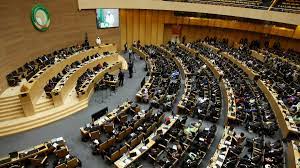YOU ARE HERE
»
Home
»
African Union
»
Ubuntu in the African Charter on Human and Peoples Rights (ACHPR)

Ubuntu in the African Charter on Human and Peoples Rights (ACHPR)
The charter (also accessible here in HTML version) was adopted in 1981. While the charter does not explicitly mention Ubuntu, which is surprising, there are several articles , including 18, 27, 28 and 29 that are all about Ubuntu.
ARTICLE 18
- The family shall be the natural unit and basis of society. It shall be protected by the State which shall take care of its physical health and moral.
- The State shall have the duty to assist the family which is the custodian of morals and traditional values recognized by the community.
- The State shall ensure the elimination of every discrimination against women and also ensure the protection of the rights of women and the child as stipulated in international declarations and conventions.
- The aged and the disabled shall also have the right to special measures of protection in keeping with their physical or moral needs.
ARTICLE 19
All peoples shall be equal; they shall enjoy the same respect and shall have the same rights. Nothing shall justify the domination of a people by another.
ARTICLE 22
- All peoples shall have the right to their economic, social and cultural development with due regard to their freedom and identity and in the equal enjoyment of the common heritage of mankind.
- States shall have the duty, individually or collectively, to ensure the exercise of the right to development.
ARTICLE 24
All peoples shall have the right to a general satisfactory environment favourable to their development.
ARTICLE 27
- Every individual shall have duties towards his family and society, the State and other legally recognised communities and the international community.
- The rights and freedoms of each individual shall be exercised with due regard to the rights of others, collective security, morality and common interest.
ARTICLE 28
Every individual shall have the duty to respect and consider his fellow beings without discrimination, and to maintain relations aimed at promoting, safeguarding and reinforcing mutual respect and tolerance.
ARTICLE 29
The individual shall also have the duty:
- To preserve the harmonious development of the family and to work for the cohesion and respect of the family; to respect his parents at all times, to maintain them in case of need.
- To serve his national community by placing his physical and intellectual abilities at its service;
- To preserve and strengthen social and national solidarity, particularly when the latter is strengthened;
- To preserve and strengthen the national independence and the territorial integrity of his country and to contribute to his defence in accordance with the law;
- To preserve and strengthen positive African cultural values in his relations with other members of the society, in the spirit of tolerance, dialogue and consultation and, in general, to contribute to the promotion of the moral well being of society;
- To contribute to the best of his abilities, at all times and at all levels, to the promotion and achievement of African unity.
Considerations for social work and development
The text emphasises that individual rights are inseparable from duties to family, society, the state, and the wider international community, carrying important implications for social work and development. Practice must balance personal freedoms with collective responsibility, fostering cohesion, solidarity, and mutual respect. There is a strong call to strengthen and preserve families, uphold intergenerational care, and promote positive African cultural values rooted in tolerance, dialogue, and consultation. Development efforts should empower individuals to serve their communities and contribute their skills, labour, and taxes to societal welfare while supporting national solidarity, security, and independence. Social work must therefore prioritise culturally grounded, family-centred, and participatory approaches that enhance moral wellbeing, economic productivity, and civic engagement, all within a broader commitment to African unity and constructive engagement with the international community.
Use the form below to subscibe to Owia Bulletin.
Discover more from Africa Social Work & Development Network | Mtandao waKazi zaJamii naMaendeleo waAfrika
Subscribe to get the latest posts sent to your email.


